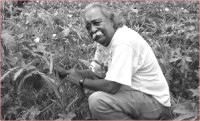| Behind the Scene
From Dinajpur
Higher Yields
Kongkon Karmaker
 Mirza Tamimul Islam Bablu, a 73 year old freedom fighter from Dinajpur has proven himself in agriculture by producing high yielding seeds. These seeds can yield two to three times the output of regular seeds, thus tremendously helping out the farmers of the northern districts. His success has earned him about 50 awards including the President Award, and awards from the World Food Program and BRRI. Mirza Tamimul Islam Bablu, a 73 year old freedom fighter from Dinajpur has proven himself in agriculture by producing high yielding seeds. These seeds can yield two to three times the output of regular seeds, thus tremendously helping out the farmers of the northern districts. His success has earned him about 50 awards including the President Award, and awards from the World Food Program and BRRI.
Mirza Tamimul Islam, known as Bablu Mirza, stepped into agriculture in 1974 when the war-torn Bangladesh was facing a severe food crisis. Aiming to eliminate the postwar food crisis in the country, he started cultivating initially on 6 acres of land in Pranagar under Birganj upazila in Dinajpur. Within 2/3 years, he was producing just about everything on his crop land.
In the last few decades since then, Mirza Bablu and his family have been completely self-sufficient they have not had to purchase any food. He and his family have been cultivating almost every cereal, vegetable, fruit, medicinal herb, condiment and oilseed crop in their six-acre farm, which does not only feed the family, but yields enough of produce to be sold at prices low enough to be affordable to the famine-stricken people of the area.
For the time being, he is gradually increasing his land volume up to 30 acres here at Pran-nagar under Birganj upazila of Dinajpur and concentrating on producing high yielding seeds. He has earned success and at present he is producing at least 34 species of seeds and selling them here in the northern districts through his farm which he has named Mirza Seeds Farm.
Following the success of his higher yields, the Bangladesh Agriculture Development Corporation (BADC) started distributing wheat seeds of Mirza Farm among the farmers since last 1991.
Md. Abdul Khaleque, a farmer from Thakurgaon told The Daily Star that these wheat seeds were able to yield 40 to 50 mounds per acre, which is much higher then the regular ones available in the market.
The list of crops and trees grown at his farm seems endless. To be brief, he has been mostly growing pulses, beans, wheat, maize, rice, sugarcane, sunflowers, plenty of fruits including grapes, grapefruit, lychee, chickoo, apricot, papaya, pomegranate, pear, jamun and lemon, vegetables like chilly, brinjal, tomato, potato, cucumber, gourds, garlic and onion, medicinal herbs like asparagus, ashwagandha, tulsi, safed musli, amla, baher and harar, condiments like turmeric, cardamom and lemon grass, and ornamental plants like gladiolus, lily, gerbera, ferns, cactus, Indian roses and paper rose.
Not just that, Mirza Bablu has also been cultivating plants that are giving rich dividends, including stevia, a sweet-leaf plant recommended for diabetic patients.
Setting a perfect example of diversification, the progressive farmer has been following the farm practices in a scientific manner.
He also traveled across India and even abroad to buy the best quality seeds and gain technical knowledge to help him earn more profit. It is not surprising that scientists and other observers from around the world come to his fields to observe this exciting crop growth.
Though he has completed his formal education in agriculture, the prizes he received include a President Award in 1978, the Award from World Food Program in 1999 and Award from Bangladesh Agriculture Research Institute in 2002.
“We can use the same straw for covering the soil in which we grow sugarcane, turmeric and gladiolas. We will be saving water while ensuring that the organic content of the soil improves and the farmer-friendly organisms are not harmed,” Bablu Mirza said.
Educating other farmers about these methods, he has convinced them to join up with him for adopting various packaging and self-marketing schemes.
The farmers in the area have come together for selling seeds and promoting them to other farmers. The women, from the village and nearby, make pickles, jams and other processed items to be sold in the market.
Mirza Bablu says, “We do not even let a single piece of fruit that falls down go waste, for the women collect these to make various recipes of chutnies and other products. Whenever we have an excess of produce, we hire daily workers and ask them to sell vegetables around the village”.
Copyright
(R) thedailystar.net 2007 |
|
